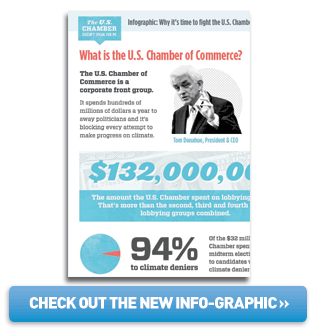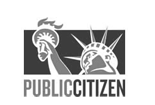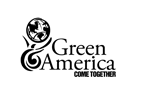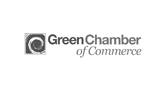Latest Updates
August 19, 2011
 Right now, the EPA is preparing to release stronger nationwide ground-level ozone (aka “smog”) standards — but America’s largest corporate business lobby is doing everything it can to postpone those efforts.
Right now, the EPA is preparing to release stronger nationwide ground-level ozone (aka “smog”) standards — but America’s largest corporate business lobby is doing everything it can to postpone those efforts.
President Obama is facing intense political pressure from the U.S. Chamber, the American Petroleum Institute and other big industry groups to delay the new pollution standards until 2013.
The U.S. Chamber is arguing that stronger ground-level ozone standards will hurt the economy — this is the same tired old rhetoric that it always uses when it’s trying to protect the profit margins of it’s wealthiest members, by playing off people’s fears. The U.S. Chamber rounded up just 170 local businesses to sign onto a letter urging a delay in the release of EPA regulations — and 170 businesses isn’t very impressive compared to the number of people in our network we know are committed to clean air and a safe climate future.
We sent a letter to the small business owners across America who have declared “The U.S. Chamber Doesn’t Speak for Me” asking them tell Obama not to delay the smog standards. Over 100 businesses signed up in under an hour after the e-mail was sent out, and by the end of the week close to 1,000 business owners had added their voice, asking that Obama protect our economy and our health by allowing the new smog standards to go through.
To read the Press Release, click the link below.
Read the rest of this entry »
August 12, 2011
Over the past few weeks, we’ve been keeping track of the U.S. Chamber’s efforts to weaken the Foreign Corrupt Practices Act, a landmark federal law passed in 1977 which criminalizes the act of bribing foreign officials. Today, the Huffington Post released an article detailing the Chamber’s lobbying efforts, with an examination of what they stand to gain if they’re successful in injecting the FCPA full of loopholes.
The Chamber has thus far managed to avoid saying that it’s outright against anti-bribery enforcement. Instead, it’s legal representatives are claiming that it wants to give the FCPA a few “tune ups” and “safeguards,” to protect corporations from overzealous prosecutors and unnecessary litigation. In reality, these “safeguards” would amount to four major loopholes in the law, which would make it easier for companies to escape criminal liability.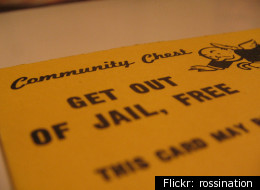
“The proposals by the Chamber are quite dramatic,” said Harvard Law School professor David Kennedy, who specializes in international law. “Although presented as modest legislative clarifications, the Chamber’s proposals would seriously undermine the enforcement efforts and scale back criminal liability under the FCPA.”
More from the Huffington Post:
“I have a hard time figuring out how they justify a push on this law that essentially amounts to, ‘We want to make it easier to bribe,'” said Per Olstad, the executive director of Chamberwatch, a labor-backed group. “There’s no clear business rationale for why the Chamber would be trying to weaken the FCPA.” His group, however, has compiled information on eight Chamber-associated companies that collectively have paid nearly a billion dollars in fines or to settle FCPA allegations. “And you start to think, there’s your motivation,” he said.
- Siemens AG – Former U.S. Chamber of Commerce board member, paid a record-setting $800 million in 2008 to settle charges that it had paid out some $1.4 billion in bribes to officials in 10 countries.
- Johnson and Johnson – 2009 U.S. Chamber of Commerce Institute for Legal Reform (ILR) board member, paid $70 million in April to settle charges that its subsidiaries paid bribes to public doctors in Greece, Poland and Romania, and paid kickbacks to officials of the Iraqi government in order to obtain contracts under the U.N. Oil for Food Program.
- Chevron – U.S. Chamber member and major donor, paid $30 million in 2007 to settle charges that it made illegal kickback payments to Iraqi officials in order to obtain contracts under the U.N. Oil for Food Program.
- General Electric – 2009 ILR board member, paid $23.4 million last year to settle charges that it made illegal kickback payments to Iraqi officials in order to obtain contracts under the U.N. Oil for Food Program.
- ACGO Corporation – U.S. Chamber board member, paid $19.9 million in 2009 to settle charges that it made illegal kickback payments to Iraqi officials in order to obtain contracts under the U.N. Oil for Food Program.
- Schnitzer Steel – U.S. Chamber board member, in 2006 paid $15.3 million to settle charges related to cash bribes and other gifts to managers of government-owned steel mills in China.
- IBM – U.S. Chamber board member, paid $10 million in March to resolve accusations that it had paid bribes and made other improper payments to officials in South Korea and China.
- El Paso Corporation – U.S. Chamber member paid 7.7 million to settle charges that it made illegal kickback payments to Iraqi officials from whom it was buying oil under the U.N. Oil for Food Program.
SOURCES: Chamberwatch, Securities and Exchange Commission, U.S. Department of Justice, FCPA Blog
If the loopholes are approved by Congress, the FCPA will essentially be gutted, and the U.S. Chamber’s corporate members will once again be able to bribe foreign officials without fear of being held accountable in a court of law.
What does this mean for America’s people and small business owners? In the case of major development projects like the proposed Keystone XL pipeline (which would cross international territory into Canada), a weakened FCPA could unfairly tip the scales in favor of polluters during the permitting process, allowing untold sums of money to be exchanged behind closed doors, with promises made in favor of greed, and against America’s people. The Chamber is blatantly flaunting it’s influence over Congress, and now more than ever we need to take a stand and say “The U.S. Chamber Doesn’t Speak for Me.”
August 9, 2011
The following article was cross-posted from U.S. Chamber watch:
The U.S. Chamber of Commerce remained suspiciously quiet throughout the default stalemate despite potentially debilitating consequences for the business community. But the Big Business lobbying group was hard at work regardless, planning an assault on the environment under the guise of job creation, but for the benefit of corporate profit.
On July 29, days before the debt-ceiling deadline, the Chamber’s “Institute For 21st Century Energy” launched its so-called “Partnership to Fuel America.” This lobbying campaign aimed to garner support for a proposed pipeline that would link Canada’s controversial oil sands to Gulf Coast refineries—a project already deemed “environmentally objectionable” by the EPA. A few days later, the Institute released its Index of Energy Security Risk, whose data supposedly “clearly [validated] the [Institute’s] recommendations…[to] eliminate regulatory barriers that are stalling urgently needed energy projects.” And just one day after Congress reached a debt-ceiling agreement, the Chamber and its allies, including Big Oil’s American Petroleum Institute, sent a letter to President Obama urging him to delay the EPA’s proposed new ozone standards, a move that came shortly after GOP Representatives “added rider after rider to the 2012 spending bill…that would essentially prevent [the EPA]…from doing [its] job.”
Why this burst of anti-environmental activity?
The Chamber and its EPA-hating friends in Congress are blaming environmental regulation for—get this—the country’s lagging economy. The Chamber’s letter to Congress, for example, read that new clean air regulations “would…impair the ability of U.S. companies to create new jobs,” and stated that “Now is not the time to saddle our economy with the extraordinary costs associated with EPA’s proposed national ozone standard.” Representative Mike Simpson (R-ID) went so far as to claim that “overregulation from EPA is at the heart of our stalled economy.”
Because of course, “America’s high unemployment rate is not the fault of the worldwide recession or the housing bubble or Wall Street hubris or two unfunded wars on top of…tax cuts for the rich,” joked The Guardian’s Diane Roberts.
And never mind that health experts are pleading Congress to enforce the stricter smog regulations—again, opposed by the Chamber—to prevent thousands of pre-mature deaths and respiratory problems that pose a costly burden to our healthcare system and economy.
It’s time for a reality check. The truth is that the Chamber’s preoccupation with environmental issues is nothing but a sinister attempt to leverage the political buzzword of the day—“jobs”—to advance its anti-regulatory agenda, benefitting its Big Oil and Dirty Coal donors at the expense of Americans’ health and safety.
Don’t blame the greenies. Blame the greedies.
August 8, 2011

AP Photo/Jeff McIntosh
Recently, the U.S. Chamber announced that it was in favor of speeding up the permitting process for the Keystone XL pipeline, which would carry an especially dirty form of crude oil from the tar sands in Alberta, Canada to Texas and the Gulf of Mexico.
It still isn’t entirely clear who stands to gain from this project if it gets approved by the State Department, but reports are starting to surface that hint to the true beneficiaries. According to this recent article in the NationalJournal, “Shell, Valero, and ConocoPhillips are expected to ship oil via the Keystone XL pipeline if it’s approved, according to the companies and TransCanada, the Canadian company seeking to build the pipeline. Two Canadian companies, Canadian Natural Resources Limited and Cenovus Energy, also have signaled interest in using the pipeline.”
Although the Chamber has fought tooth-and-nail to keep corporate disclosure laws at bay (effectively keeping it’s biggest corporate donors a secret), it’s well known the national organization has close ties to the oil industry (ExxonMobil is one of it’s members, and Shell President Marvin Odum recently spoke at a U.S. Chamber event about the Keystone XL). And as the country’s major oil companies get in line to rake in major profits from the Keystone XL pipeline, the U.S. Chamber lurks nearby, flexing it’s muscles in Washington DC and eagerly awaiting it’s share of the dirty money.
On the surface, the U.S. Chamber is talking about the Keystone XL pipeline as something that will keep America safe, secure and prosperous—as if this project were being pushed forward for the benefit of the American people and it’s small business owners. This line is easy on the ears, but simply put, it isn’t true. The Chamber wants the approval of this project because it means a major spike in profits for it’s members and, therefore, for the Chamber itself. Here’s what the Chamber isn’t telling the business community about the Keystone XL:
- The new pipeline would run through six Midwestern states and across the pristine Ogallala Aquifer, which provides fresh drinking water to 2 million Americans in eight states and supports significant fractions of the nation’s economy through irrigation for livestock, food and fiber crops. If the pipeline were to leak, the consequences would be disastrous for the Midwest and the entire country writ large.
- There is a marked lack of independent, peer-reviewed scientific research demonstrating that transporting the tar sands crude oil using conventional oil pipeline technology is actually safe. The “DilBit” crude oil is more corrosive than regular oil, and it would be thinned with other petroleum condensates and then pumped at high pressure and at a temperature of more than 150 degrees through the pipeline. “A new TransCanada pipeline that began carrying diluted bitumen last year has already had nine spills.” -NY Times Editorial
- Even if the Keystone XL pipeline never ruptured (an unlikely scenario), the completion of this project will have a devastating and economically disastrous impact on the climate. Dr. James Hansen, director of NASA’s Goddard Institute for Space Studies, is vehemently opposed to the Keystone XL pipeline, stating that “exploitation of tar sands would make it implausible to stabilize climate and avoid disastrous global climate impacts.“ Additionally, twenty of the nations leading scientists have just released a letter to Obama asking him not authorize the permit for the Keystone XL.
- The Energy Department says the pipeline would have a minimal effect on national gas prices, and may even lead to an increase in oil and gas prices in the Midwest.
- There is already sufficient pipeline capacity to double United States imports from Canada, without building the Keystone XL.
For all of these reasons and more, an unprecedented coalition of organizations and individuals are coming together to fight the Keystone XL pipeline. The U.S. Chamber is only one of the monolith, profit-mongering institutions that we’re up against, but it plays a major role in the public debate over this project. For that reason, we are asking local chambers and small businesses across the country to publicly oppose the Keystone XL pipeline—our elected leaders need to hear from America’s real business community, not just it’s biggest corporate lobby. If you own a small business or know someone at a local chamber of commerce, e-mail us at chamber@350.org so that we can collect your comments. Otherwise, stay tuned and we’ll continue to send important updates on this fight to protect America’s economy and the environmental systems that sustain it.
August 2, 2011
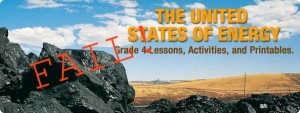 Back in May, we reported that Scholastic Inc., an educational book-publishing company, had been distributing a biased U.S. Chamber and coal industry-sponsored report called “The United States of Energy” to 4th-grade classrooms. A coalition of organizations and individuals came together and asked the CEO of Scholastic to stop pushing the coal-sponsored report, and shortly after the company agreed to remove it from their website. This signified a small victory in the larger fight to get all biased and industry-sponsored propaganda out of classrooms.
Back in May, we reported that Scholastic Inc., an educational book-publishing company, had been distributing a biased U.S. Chamber and coal industry-sponsored report called “The United States of Energy” to 4th-grade classrooms. A coalition of organizations and individuals came together and asked the CEO of Scholastic to stop pushing the coal-sponsored report, and shortly after the company agreed to remove it from their website. This signified a small victory in the larger fight to get all biased and industry-sponsored propaganda out of classrooms.
Just two months later, we’re happy to report that the same coalition of organizations, teachers and parents have convinced Scholastic Inc. to completely reform it’s practice of sharing corporate-sponsored materials in classrooms (like the U.S. Chamber-funded “Shedding Light on Energy” report). By keeping fossil fuel bullies like the U.S. Chamber and the American Coal Foundation out of our kids’ classrooms, we have a real chance of shifting the public dialogue around clean energy. This is a huge victory for parents, their children, and for the clean energy movement as a whole—read the full story from Common Dreams below:
In response to pressure from tens of thousands of parents, educators and grassroots advocates, Scholastic Inc. has agreed to drastically limit its practice of partnering with corporations to produce sponsored teaching materials. Scholastic’s announcement is the culmination of a three-month campaign led by the Campaign for a Commercial-Free Childhood.
The publisher had been under fire since May, when it was forced to stop distributing a biased curriculum called “The United States of Energy” that was paid for by the coal industry and distributed to fourth-grade classrooms across the country. CCFC and Rethinking Schools called on Scholastic to drop the curriculum. After Scholastic capitulated, CCFC expanded the campaign—in concert with online social action platform Change.org—to lobby for sweeping reforms to Scholastic’s controversial InSchool Marketing division, which produced teaching materials sponsored by corporations, nonprofits and government agencies.
Last Thursday, Scholastic notified CCFC and Change.org of major changes to its InSchool Marketing Program, including:
- A 40% reduction in the materials produced by InSchool Marketing, with the overwhelming majority of those cuts coming from its corporate-sponsored programs.
- The creation of a Partner Review Board consisting of a curriculum editor, a teacher, a school administrator, a child psychologist, and a parenting expert to evaluate potential partners and review the content of sponsored programs.
- Required approval for all sponsored curriculum by the Partner Review Board.
The changes are highlighted in today’s New York Times. In addition, Scholastic confirmed to CCFC that it has ended a two-year partnership with SunnyD, in which the sugar-laden beverage was promoted in elementary school classrooms.
Read the rest of this entry »
July 27, 2011
 Today, the US Chamber of Commerce applauded a move by the House to try and rush the construction of the Keystone XL, a new pipeline that would carry dirty tar sands oil from Alberta down to refineries on the Gulf of Mexico. The State Department is currently reviewing the project before making a final decision on behalf of the Obama Administration to grant a Canadian company permission to begin construction.
Today, the US Chamber of Commerce applauded a move by the House to try and rush the construction of the Keystone XL, a new pipeline that would carry dirty tar sands oil from Alberta down to refineries on the Gulf of Mexico. The State Department is currently reviewing the project before making a final decision on behalf of the Obama Administration to grant a Canadian company permission to begin construction.
The Keystone XL has become a symbol across the country of the recklessness fossil fuel companies show in regards to public health and our environment. The pipeline route threatens major water supplies, like the Ogalla Aquifer, and would aid the expansion of the tar sands, the largest and dirtiest fossil fuel project on the planet. NASA scientist Dr. James Hansen said if the tar sands are fully developed it is essentially “game over” for the climate.
But forget the climate, the money game is the only one that the US Chamber seems to care about. Not surprisingly, they, the Koch Brothers, and the major oil companies have all become champions of the project despite widespread opposition.
We’ll be following the growing opposition to the Keystone XL pipeline over the summer, as well as increasing our campaign to counter act the influence of the US Chamber. They may speak for the largest oil companies in the world, but they certainly don’t speak for the interests of everyday Americans.
July 21, 2011
A few days ago, we reported that the U.S. Chamber was leading a high-profile campaign to weaken a landmark anti-bribery law called the Foreign Corrupt Practices Act (FCPA), which bars companies with U.S. ties from bribing foreign officials to get or retain business. In a recent post by The Wall Street Journal, they explore newly released lobbying reports which shed light on the amount of money that the U.S. Chamber has spent to amend and weaken the law. Read their findings below:
How much has The Chamber spend on lobbying FCPA reform?
The short answer is we don’t know, precisely. But a review of newly submitted lobbying records maintained by the U.S. House of Representatives sheds some light.
According to the records, the U.S. Chamber Institute for Legal Reform paid outside lobbyists $390,000 in the first and second quarters of this year in its push to amend the Foreign Corrupt Practices Act. But that figure includes charges for other Chamber causes such as tort reform; lobbying records are itemized by issue, not fees.
ILR’s FCPA wish list includes a compliance defense; a narrower definition of who qualifies as a foreign official; limited liability for the past actions of newly acquired companies and for the conduct of subsidiaries; and a “willfulness” requirement for corporate criminal liability.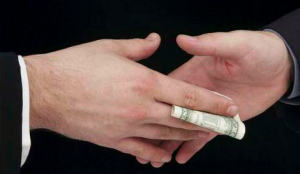
The Chamber shelled out $120,000 for the services of former Attorney General Michael Mukasey, now a partner at Devoise & Plimpton LLP, in the first two quarters of 2011, the records show. Mukasey has been enlisted to lobby on amendments to the FCPA and “issues related to criminal law and policies affecting U.S. corporations,” the records say.
ILR has paid Washington lobbying firms Hollier & Associates LLC and JDM Public Strategies LLC a total of $80,000, much of it for lobbying on FCPA reform, since the beginning of the first quarter.
Brownstein Hyatt Farber Schreck LLP, meanwhile, collected about $100,000 to lobby on FCPA and tort reform in the first two quarters, according to the records.
In its disclosure, Akin Gump Strauss Hauer & Feld LLP showed a $90,000 tab in the first quarter for lobbying on the FCPA, tort reform, Medicare and other civil and criminal enforcement issues on behalf of the ILR.
Not all of the second quarter reports were available as of Wednesday morning, so the total could change.
ILR, for its part, recorded about $6 million in lobbying expenses (for all issues, including the FCPA) in the first quarter and $5.6 million in the second quarter, according to the lobbying records.
The lobbying effort appears to have produced serious results, including a House subcommittee hearing last month on amendments to the FCPA that the Chamber first proposed in October 2010. Rep. Jim Sensenbrenner (R., Wis.), who chaired the hearing, said he planned to introduce a bill.
Harold Kim, senior vice president at the U.S. Chamber of Commerce, is coordinating the lobby effort. A Chamber spokesman said the records “accurately reflect the work being done in this area” but declined to comment beyond the public disclosures.
In an odd bit of symmetry, News Corp.’s independent directors have hired Mukasey and Mary Jo White, a former United States attorney for the Southern District of New York, to advise them as the phone-hacking scandal threatens to expand, Bloomberg and Reuters reported Tuesday night.
The FBI is investigating whether News Corp. employees tried to hack into voice mails of Sept. 11 victims, and federal authorities are also trying to determine if alleged bribes paid to British police officials could constitute a violation of the Foreign Corrupt Practices Act, The Wall Street Journal reported.
News Corp. has hired Mark Mendelsohn, a partner in the Washington, D.C. office of Paul Weiss Rifkind Wharton & Garrison LLP to advise it, the Journal reported separately. Mendelsohn, as readers of this blog will know, oversaw the Justice Department’s ramp up of FCPA enforcement as a deputy chief in the criminal fraud section.
July 20, 2011
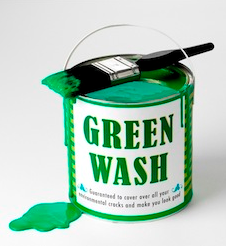 This week in Las Vegas, the U.S. Chamber’s corporate citizenship affiliate, the Business Civic Leadership Center, is hosting a conference on “environmental sustainability.” In a blog on GreenBiz.com, a public affairs executive lists 5 reasons why he thinks the U.S. Chamber can be a “force for green”, with the upcoming conference setting the stage. It’s a blatant attempt to paint the U.S. Chamber as a business lobby that has the potential to catapult environmental sustainability and innovation to the forefront of industry, but we know better. The U.S. Chamber has chosen polluters over people every time it’s taken a political stance in Washington DC, and there has been no indication that it’s leadership will have a change of heart anytime soon.
This week in Las Vegas, the U.S. Chamber’s corporate citizenship affiliate, the Business Civic Leadership Center, is hosting a conference on “environmental sustainability.” In a blog on GreenBiz.com, a public affairs executive lists 5 reasons why he thinks the U.S. Chamber can be a “force for green”, with the upcoming conference setting the stage. It’s a blatant attempt to paint the U.S. Chamber as a business lobby that has the potential to catapult environmental sustainability and innovation to the forefront of industry, but we know better. The U.S. Chamber has chosen polluters over people every time it’s taken a political stance in Washington DC, and there has been no indication that it’s leadership will have a change of heart anytime soon.
Here are 5 facts (out of hundreds) that prove the U.S. Chamber is anything but environmentally sustainable:
1. Many high profile members of the U.S. Chamber are quitting or distancing themselves from the national organization. Apple, PG&E, Nike and many other corporations are publicly distancing themselves or quitting the U.S. Chamber altogether because of it’s stance on climate change and environmental protection.
2. Many local chamber affiliates are quitting the U.S. Chamber, because it’s partisan politicking around political and environmental issues in Washington DC is contradictory to what small business owners in this country want. Stan Kosciuszko, president of the Butler County, Pennsylvania, Chamber of Commerce, which is no longer a member of the Chamber, said, ‘They’ve abandoned the interests of smaller chambers like status unclear mine for their larger corporate members.’
3. Climate change presents the most critical environmental challenge of our time, threatening the global economy and the survival of hundreds of millions of people, and the U.S. Chamber has done everything in it’s power to stop any legislation around the problem. In 2009, for instance, one of their Vice Presidents demanded a “Scopes monkey trial” on global warming: “it would be the science of climate change on trial,” the chamber’s senior vice-president for environment, technology, and regulatory affairs explained. More recently, they petitioned the EPA to take no action on climate change, on the grounds that “populations can acclimatize to warmer climates via a range of range of behavioral, physiological, and technological adaptations.” We don’t know who those 16 companies are, but you can pretty much guess how they make their money, and why they use the Chamber to launder it.
4. The U.S. Chamber says that regulation to control carbon pollution kills jobs—this is a lie, and it’s preventing our country from creating good paying green jobs for Americans. Already, more Americans have green jobs than oil or gas jobs. The truth is that regulation is good for the environment and for the economy, but the Chamber is hoping that in these hard economic times, Americans’ concern about jobs will scare them into believing that regulation of greenhouse gases will stifle job growth.
5. The U.S. Chamber spends more money than any other group to influence our democracy and rollback environmental regulations that would help our economy and clean up our environment. In 2010, it spent over $33m on attack ads and elections throughout the country, 93% of that cash going to far-right conservative candidates intent on stopping the EPA from cleaning up our air and atmosphere.
While it’s true that the business community has a pivotal role to play in lowering global carbon emissions and promoting economic recovery through environmental and clean energy innovation, the U.S. Chamber has proven—through it’s history of lobbying to dismantle the EPA and stop any progress on climate change—that environmental sustainability is the last thing on it’s mind. Far from being a “force for green”, the U.S. Chamber is the most notorious anti-environmental, non-sustainable organization in the country.
July 14, 2011
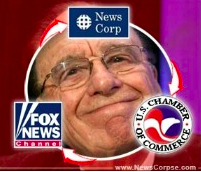 News Corporation, the media conglomerate owned by Rupert Murdoch, has recently come under fire for hacking into the phones of celebrities, crime victims and politicians in the UK, and possibly into the phones of 9/11 victims here in the U.S. as well. Allegations of police bribery are surfacing amid the scandal, and News Corp faces a potential U.S. investigation under the Foreign Corrupt Practices Act, a landmark anti-bribery law.
News Corporation, the media conglomerate owned by Rupert Murdoch, has recently come under fire for hacking into the phones of celebrities, crime victims and politicians in the UK, and possibly into the phones of 9/11 victims here in the U.S. as well. Allegations of police bribery are surfacing amid the scandal, and News Corp faces a potential U.S. investigation under the Foreign Corrupt Practices Act, a landmark anti-bribery law.
If convicted, the executives at News Corp could face huge fines and jail time, so they must be thrilled that their pals at the U.S. Chamber hate anti-corruption laws as much as they do. The Chamber has received millions in funding from News Corp, so the behemoth corporate lobbying group is doing everything it can to weaken the anti-bribery law. Check out the full story, cross-posted from ThinkProgress,org, here:
News Corporation faces a potential U.S. investigation and prosecution under the Foreign Corrupt Practices Act (FCPA), a law that bars companies with U.S. ties from bribing foreign officials to get or retain business, stemming from widely-reported allegations of bribing police. News Corp, like several other major corporations recently targeted under the law, would not only be liable for the costs of any investigation — whether or not it is ever charged — but could also face billions in fines and even jail time for its executives if it were found guilty of violating of the anti-corruption statute.
The Obama administration has stepped up enforcement of the FCPA in recent years, and one FCPA expert, Butler University Professor Mike Koehler, told the Guardian that he would be “very surprised” if U.S. authorities don’t become involved in the growing News Corp scandal.
This stepped up enforcement of the FCPA has not escaped the notice of the U.S. Chamber of Commerce, which has reportedly received millions of dollars in funding from News Corp. The Chamber is now leading a high-profile campaign to weaken the landmark anti-bribery law.
On October 27, 2010, the Chamber’s Institute for Legal Reform held a summit at which it released a white paper outlining the Chamber’s suggestions for weakening the FCPA. After its 2010 summit, the Chamber began actively lobbying Congress to weaken the FCPA. In March of this year, the Chamber’s ILR hired marquee talent, former Bush administration Attorney General Michael Mukasey, to aid in its push to weaken the law. According to filings with the Senate, the Chamber’s ILR spent $6,030,000 lobbying on the FCPA and numerous other bills during the first quarter of 2011. During the 4th quarter of 2010, the Chamber’s ILR spent an additional $14,490,000 lobbying on the FCPA and other bills.
In addition to its own direct lobbying activities, the Chamber’s ILR engaged several lobbying firms during the first half of this year to help it push Congress to weaken the anti-bribery law, including Brownstein, Hyatt, Farber, and Schreck; Hollier & Associates; Akin, Gump, Strauer, Hauer & Feld; and Debevoise & Plimpton (Mukasey’s firm).
The Chamber’s ILR, in its white paper, lamented the fact that the corporations would continue to be held accountable for their criminal activities:
Unfortunately for the business community, an active FCPA enforcement environment appears likely to continue.
Specifically citing the Chamber’s lamentations, the Republican-led House of Representatives is currently drafting a bill to weaken the FCPA. A hearing held last month by Rep. James Sensenbrenner (R-WI), who chairs the House Judiciary Subcommittee on Crime, Terrorism, and Homeland Security, gave Chamber lobbyist Mukasey a platform to reiterate the Chamber’s ideas for weakening the anti-bribery law.
While any changes to the FCPA may come too late to help News Corp, it’s clear that the Chamber’s campaign to weaken the landmark anti-bribery law is already showing some early signs of success.
July 13, 2011

Today, we are launching a new site called “US Chamber of Secrets,” an effort to reveal the corruption and sordid history of the U.S. Chamber of Commerce.
The final installment of Harry Potter is finally here, and anyone who has read the final book knows that it is full of a more sinister good vs. evil plot than many of its predecessors. Instead of shallow villains we get vast conspiracies, inside jobs, corrupted governments, and elected leaders taken over by the forces of evil.
Truth be told, this spooky story has a lot of resemblance to real life.
Our government officials have not been cursed by dark lords and magic like their counterparts in the world of Harry Potter.
In real life, groups like the US Chamber of Commerce use money to charm their way into the offices of our elected leaders. In real life, they use their coffers of cash to intimidate politicians, fund extremist candidates, and run propaganda campaigns telling us that our tax dollars belong in the pockets of corporations.
As spooky as the last installment of Harry Potter might be, the real life story of the US Chamber of Commerce might actually be hiding more sinister secrets than Hogwarts. From fighting against civil rights and clean air to their attempts to dismantle health care and stop action on climate change: The US Chamber is hiding much of its history away.
We invite you to take a moment to dive into the deep, dark, dirty, and sometimes even scary secrets lurking beneath the surface of the US Chamber and its ever-present puppet master Tom Donohue.
It’s time to open the US Chambers vault of secrets and share them with the world–but we need you to help make it happen.
Check it out, then tweet it, facebook it, email it: just take a moment to pass this on.
http://www.uschamberofsecrets.org
 Right now, the EPA is preparing to release stronger nationwide ground-level ozone (aka “smog”) standards — but America’s largest corporate business lobby is doing everything it can to postpone those efforts.
Right now, the EPA is preparing to release stronger nationwide ground-level ozone (aka “smog”) standards — but America’s largest corporate business lobby is doing everything it can to postpone those efforts.
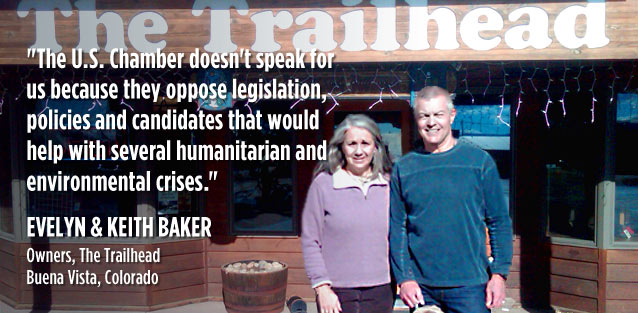

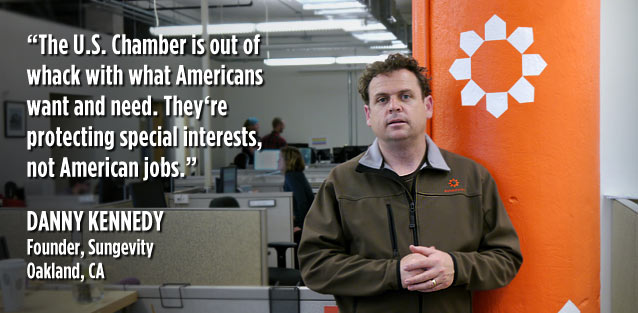

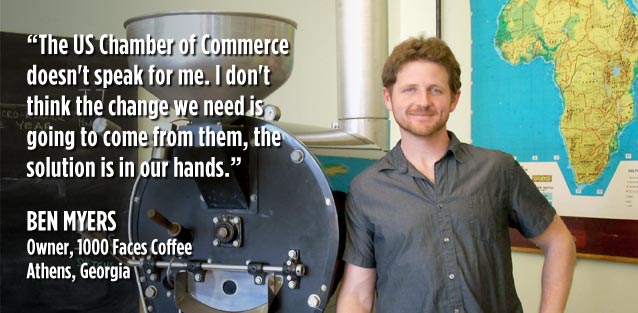




 Today, the
Today, the 


